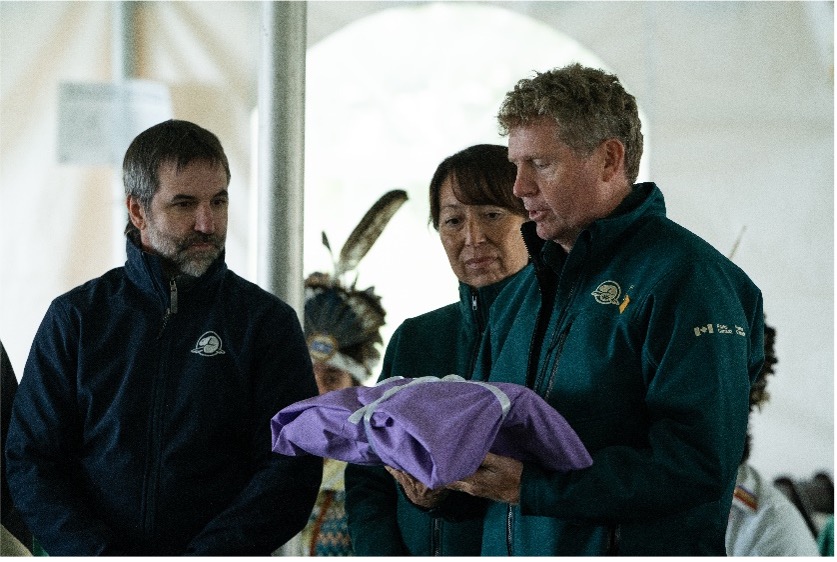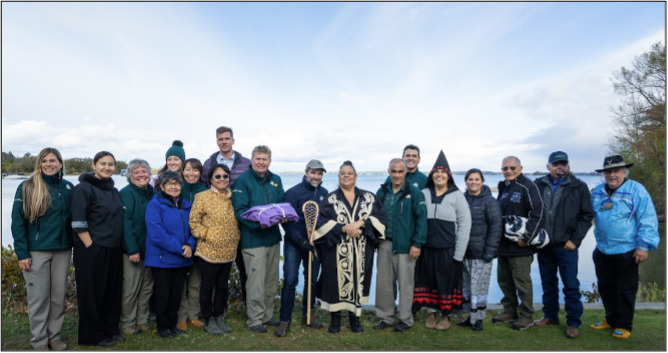Parks Canada’s New Indigenous Stewardship Policy – Weaving Indigenous Knowledge and Western Science
Ron Hallman, President & CEO at Parks Canada discusses the new Indigenous Stewardship Policy which emphasizes relationships, truth-telling, and respect for Indigenous knowledge. It supports conservation, economic opportunities, and resilience to climate change while ensuring Indigenous leadership in managing heritage places.
“Within the spirit of the Indigenous, there is a memory, original instructions that can define our humanity. All those original instructions are based on values and teachings that ensure survival and respect for the land and its natural laws. Our people have always understood that ‘all life is connected.’ You cannot fragment the Earth with the policies or structures.”
— Elder Dave Courchene, Sagkeeng First Nation, September 2017
Over the past two decades, Parks Canada has undertaken an increasing number and variety of stewardship initiatives with Indigenous partners, whether in a restoration initiative like in the Coast Salish clam gardens off the coast of Vancouver Island undertaken in partnership with the Hul’qumi’num speaking Nations and W̱SÁNEĆ Nations, working with Inuit Guardians for protection and monitoring at the wrecks of HMS Erebus and HMS Terror, or establishing a new protected area in P.E.I. with Mi’kmaq Epekwitnewaq Kapmntemuow. In these experiences, Parks Canada, the Indigenous communities, and people across Canada benefit from this rich approach in developing stewardship strategies and experiences for visitors.

As the President & Chief Executive Officer of Parks Canada, continuing to champion Indigenous stewardship initiatives in support of recommendations by the Truth and Reconciliation Commission and the United Nations Declaration on the Rights of Indigenous Peoples is a fundamental aspect of my work and remains a key priority for me. That is why I am very pleased to share with readers a recent policy initiative that has been developed in collaboration with Indigenous partners and co-developed with an Indigenous Stewardship Circle – and that will more robustly support the implementation of Indigenous stewardship initiatives.
Parks Canada’s new Indigenous Stewardship Policy emphasizes the importance of relationships with Indigenous Peoples, understanding and education, and the need for truth-telling, and offering an apology, acknowledgement, and redress for past wrongs. It lays the groundwork for stewardship initiatives that support Indigenous cultural continuity and creates opportunities for shared governance and economic opportunities while respecting Indigenous systems of knowledge, governance, and law. The policy is supported by values of trust, respect and reciprocity and by principles that emphasize ethical space and the honouring of Indigenous rights and responsibilities.
“Parks Canada’s new Indigenous Stewardship Policy emphasizes the importance of relationships with Indigenous Peoples, understanding and education, and the need for truth-telling, and offering an apology, acknowledgement, and redress for past wrongs”
-Ron Hallman
The policy was enacted in a ceremony attended by members of the Indigenous Stewardship Circle and the Honourable Steven Guilbeault, Minister responsible for Parks Canada, as well as representatives from Parks Canada, and invited guests at Thousand Islands National Park on October 15th, 2024, with hosts from the Mohawk Nation of Akwesasne. The ceremony served to formalize the policy in a way that honoured the relationships and both Indigenous protocols and non-Indigenous, governmental practices. Enacting the policy in this way demonstrated the principle of ethical space in action, and this approach will continue as we move forward and center Indigenous Peoples’ stewardship at heritage places across Canada.

This centering of Indigenous practices, protocols, and lifeways, along with the rights and responsibilities of Indigenous Peoples as the stewards of the lands, waters, and ice with their traditional territories, treaty land and ancestral homelands hasn’t always been the focus of Parks Canada activities, and although we have made great strides in recent decades to work in collaboration with Indigenous Peoples, and respect and honour their knowledge, understandings and priorities, there is much still to be done. The Indigenous Stewardship Policy will support and sustain this ongoing work in the future.
The successful implementation of this policy is important for many reasons. It engenders respect for approaches to land stewardship that have been occurring since time immemorial while simultaneously creating space for the inclusion of generational thinking and practice that will strengthen and revitalize approaches to conservation. It lays the foundation for equitable, effective, and collaborative stewardship now and into the future, and notably, it supports the reconnection of Indigenous Peoples to their responsibilities and their languages, cultures, and lifeways. The policy considers stewardship and protected area management in the context of many generations to come, and with a lens to the future health of our ecosystems. Indigenous stewardship is critical for successful conservation outcomes and the health of ecosystems, communities, and individuals, and we all stand to benefit from the implementation of this policy, so long as it is implemented effectively, and within the spirit and intent within which it was co-created. Its implementation will also offer Parks Canada, all Canadians, and the world, rich opportunities for (re)connection, learning, and understanding.
“Although we have made great strides in recent decades to work in collaboration with Indigenous Peoples, and respect and honour their knowledge, understandings and priorities, there is much still to be done”
-Ron Hallman
Implementation of the Indigenous stewardship policy will also play a crucial role in combating climate change and supporting healthy ecosystems. Indigenous communities have deep systems of knowledge and long-standing responsibilities to the land that define how they prioritize biodiversity and resilience, which are all essential for mitigating climate impacts. Moreover, Indigenous stewardship promotes conservation methods that are culturally relevant and effective, helping to protect critical habitats and restore degraded landscapes.

Now, with the Indigenous Stewardship Policy in place, Parks Canada and Indigenous partners can continue progress towards shared governance arrangements that more fully reflect Indigenous legal orders, and rights and responsibilities for lands, waters, and ice that Indigenous Peoples have stewarded for millennia. Parks Canada and Indigenous partners can also work to support cultural continuity, which includes important stewardship practices of harvesting, knowledge-sharing, and learning on the land. This policy commits Parks Canada to working to support economic opportunities. It is also a commitment to working with Indigenous Peoples to ensure that Indigenous knowledge and approaches become fundamental to conservation practices and decision-making while also ensuring that Indigenous Peoples take on leadership roles in shaping approaches to Indigenous Stewardship at all places Parks Canada has a role in administering. By weaving knowledge systems – Indigenous knowledge and western science – we can undertake stewardship fosters greater resilience to climate change while also ensuring that Indigenous rights and responsibilities are upheld through more equitable governance approaches.
In implementing this policy with Indigenous partners across Canada, we are excited to see how our shared stewardship approaches will evolve and guide our efforts on landscapes, among Indigenous communities, within ecosystems, and with visitors.














